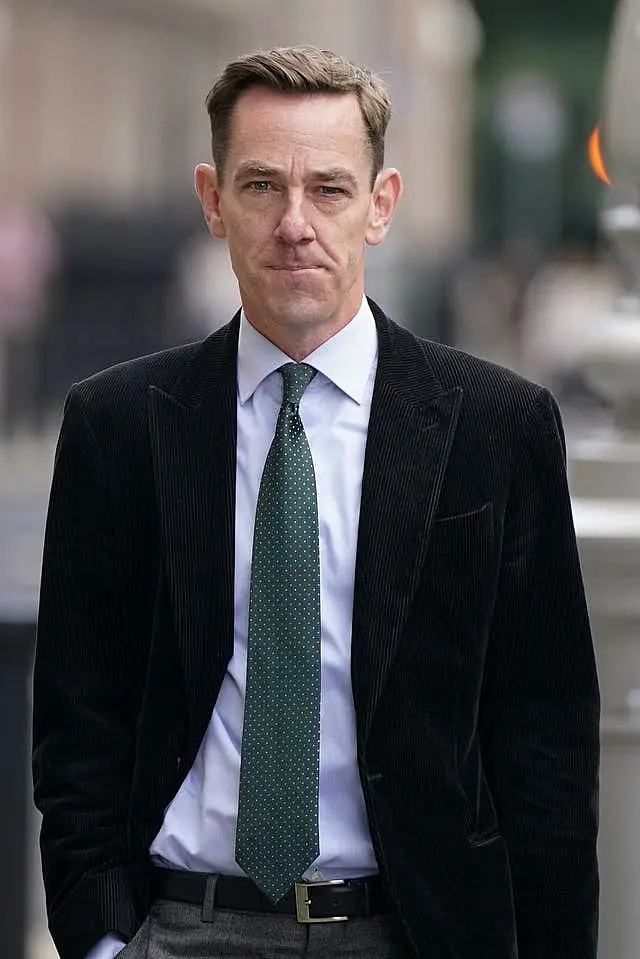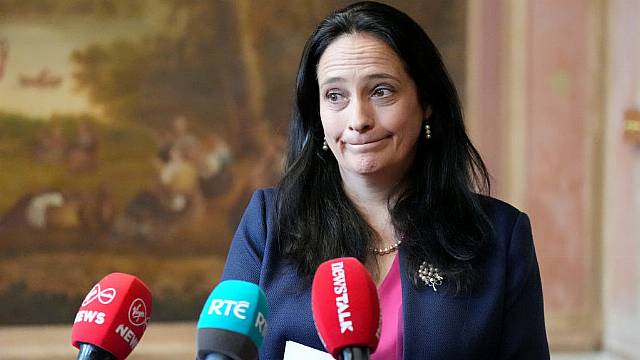Updated at 20:11
The national broadcaster RTÉ recorded “fictitious” accounting transactions and operated with a “lack of trust” between its board and senior management, according to long-awaited expert reports.
It comes as more than 100 recommendations from two reports ordered by the Government were published on Tuesday, alongside an examination on the organisation’s use of off-balance sheet transactions.
Media Minister Catherine Martin said her department will withhold a second round of funding to RTÉ pending its implementation of recommendations contained in a series of reports.
Ms Martin has also said the report of RTÉ’s barter account provides further evidence of “poor governance”.
In a press conference, she said: “The (recommendations) will bring further transparency on the remuneration of top presenters in RTE, both on air and off-air. The reviews I have published today make clear that the governance of RTÉ requires radical reform.
“While much of this work must be carried out by the RTÉ board and Leadership Team, the Review of Governance and Culture found that the legislative framework underpinning the governance of RTÉ contained in the Broadcasting Act needs fundamental reform.”
She added: “Earlier today, the chair and director-general of RTÉ both gave me a clear commitment that RTÉ accepts the recommendations of the reviews in principle and will implement the recommendations of the Expert Advisory Committees.
“On foot of this, I intend, with the agreement of the Minister for Public Expenditure, NDP Delivery and Reform, to release the first tranche of €40 million in additional Exchequer resources allocated to RTÉ this year.
“The dispersal of the final tranche later this year will be subject to a satisfactory assessment of RTÉ’s updates on the implementation of the plan by my department and the further agreement of the Minister for Public Expenditure, NDP Delivery and Reform.”
Asked about timescales with a general election due in the next year, Minister for Media Catherine Martin said there will “definitely be a decision” on the funding model for RTÉ before the summer.
Implementation plan
“That was something that we agreed at Cabinet today too,” she said.
“I can move as quickly as possible on this, and that is what I will be doing. Time is slightly against me as far as this Government can go, but I am focused on moving this as fast as possible.
“There are a number of amendments to the Broadcasting Act. The key will be that implementation plan with the timelines. We will have a bit more clarity on that in six weeks’ time.”
She said she hopes the actions necessary can be completed before the general election, but if it cannot, it will be for the next government to complete.
“I would hope that any government that is in place after the next election will take very seriously the key recommendations from expert groups that are putting RTÉ and public service broadcasting on sure footing,” she said.
Minister for Media Catherine Martin said the reviews so far have cost around €574,000 and could reach more than one million euros.
She said she believes the reports “represent value for money”.
“I think that today is the first day where we can really see there is a path forward for RTÉ and indeed for public service media,” she said.
“But I do believe the scale of the financial, organisational and reputational issues in RTÉ merited this root and branch review and examination, and the fact that we have 116 recommendations,” she said.
“More importantly the fact that we are in a position now today where I am saying we accept all the recommendations, but more importantly RTÉ is accepting their recommendations and we’re looking to an implementation plan, to moving forward and a funding model.”
It also recommended requiring RTÉ to include a financial or formula cap in any future exit scheme; reforming the approach to engaging and paying presenters; improve the functioning of the RTÉ Board and its committees; and ensure greater transparency for higher executive pay.
It further recommended to improve the accountability of the director general to the RTÉ Board; strengthen the implementation of gender, equality, diversity and inclusion policies in the broadcaster; and ensure the review of roles and grades and forthcoming review of allowances in RTÉ are effective, transparent and include consultation with employees.
The cost of three reports has amounted to around €570,000 to date, however the cost is expected to reach as much as €1 million as the department awaits confirmation of further invoices.
The review of governance and culture includes 90 recommendations to reform RTÉ’s corporate governance framework, its organisational culture and its way of doing business.
The review of its HR practices made 26 detailed recommendations, including improving the oversight and mechanisms by which it engages contractors and presenters and the use of short-term employment contracts and employment terms and conditions in RTÉ.
The Government said it has accepted in principle all 116 recommendations made by the expert advisory committees.
RTÉ will now be required to prepare an implementation plan within six weeks, setting out the actions and associated timelines that it will take to implement the recommendations.

The implementation plan will be overseen by a monitoring group, composed of the Minister’s department and senior representatives and NewERA (New Economy and Recovery Authority).
RTÉ was plunged into crisis in June last year after it admitted understating the fees for its star presenter and previous top-earner Ryan Tubridy.
A series of probing parliamentary committee hearings also uncovered other concerns about culture, governance and financial management at RTÉ and there have been several high-profile resignations from the board and executive of the station.
Disclosures during the scandal revealed the use of barter accounts by the broadcaster’s commercial wing.
Barter accounts are commonplace in the media industry to allow organisations to exchange advertising airtime that would otherwise go unsold in return for goods and services from companies.
However, RTÉ’s use of the accounts came under intense scrutiny and a previous report found that there were significant gaps in controls and record keeping.
The organisation commissioned external auditors to produce reports on the Tubridy payments, the use of barter accounts and voluntary exit schemes as well as an ill-fated musical which accrued millions of euros in losses.
However, Ms Martin has said the two independent expert reports which were ordered by her Department will form the main basis for the Government’s decision on reforming the funding of public-service broadcasting in Ireland, including RTÉ.
A pre-existing steady decline in licence fee revenue was accelerated by the expanding controversy.
RTÉ operates on a dual-funding model that sees around 55 per cent of its income brought in through the obligatory licence fee, which costs €160 a year for Irish households with a television.
Approximately 85 per cent of revenue from TV licence fees goes to RTÉ to carry out its public service broadcasting commitments, while it also earns money through commercial operations.
RTÉ’s director-general Kevin Bakhurst, who assumed the role in the early weeks of the crisis, has also announced a strategic plan for reforming the institution by 2028.
It includes cutting headcount by 400 – a reduction of up to 20 per cent – and a significant increase in investment in the independent production sector.
RTÉ said it has welcomed the publication of the reports.







